打印快乐英语知点总结
- 格式:docx
- 大小:27.37 KB
- 文档页数:10
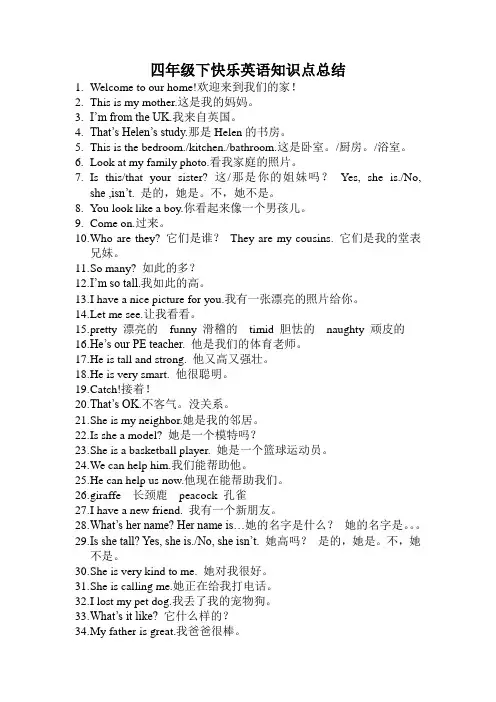
四年级下快乐英语知识点总结1.Welcome to our home!欢迎来到我们的家!2.This is my mother.这是我的妈妈。
3.I’m from the UK.我来自英国。
4.That’s Helen’s study.那是Helen的书房。
5.This is the bedroom./kitchen./bathroom.这是卧室。
/厨房。
/浴室。
6.Look at my family photo.看我家庭的照片。
7.Is this/that your sister? 这/那是你的姐妹吗?Yes, she is./No,she ,isn’t. 是的,她是。
不,她不是。
8.You look like a boy.你看起来像一个男孩儿。
e on.过来。
10.W ho are they? 它们是谁?They are my cousins. 它们是我的堂表兄妹。
11.S o many? 如此的多?12.I’m so tall.我如此的高。
13.I have a nice picture for you.我有一张漂亮的照片给你。
14.L et me see.让我看看。
15.p retty 漂亮的funny 滑稽的timid 胆怯的naughty 顽皮的16.H e’s our PE teacher. 他是我们的体育老师。
17.H e is tall and strong. 他又高又强壮。
18.H e is very smart. 他很聪明。
19.C atch!接着!20.T hat’s OK.不客气。
没关系。
21.S he is my neighbor.她是我的邻居。
22.I s she a model? 她是一个模特吗?23.S he is a basketball player. 她是一个篮球运动员。
24.W e can help him.我们能帮助他。
25.H e can help us now.他现在能帮助我们。
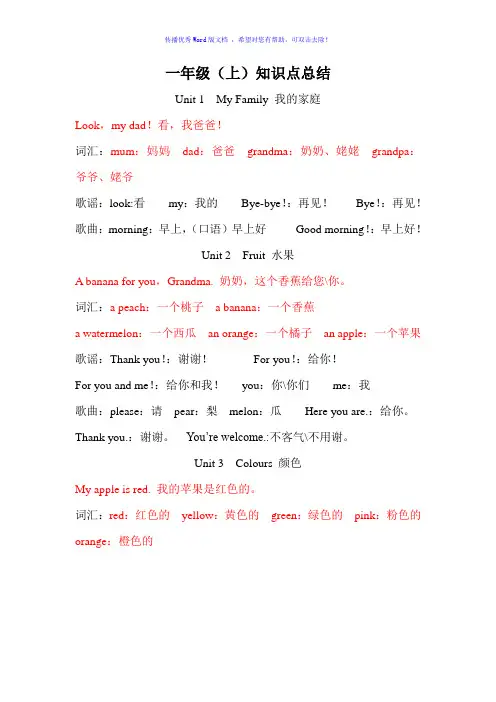
一年级(上)知识点总结Unit 1 My Family 我的家庭Look,my dad!看,我爸爸!词汇:mum:妈妈dad:爸爸grandma:奶奶、姥姥grandpa:爷爷、姥爷歌谣:look:看my:我的Bye-bye!:再见!Bye!:再见!歌曲:morning:早上,(口语)早上好Good morning!:早上好!Unit 2 Fruit 水果A banana for you,Grandma. 奶奶,这个香蕉给您\你。
词汇:a peach:一个桃子 a banana:一个香蕉a watermelon:一个西瓜an orange:一个橘子an apple:一个苹果歌谣:Thank you!:谢谢!For you!:给你!For you and me!:给你和我!you:你\你们me:我歌曲:please:请pear:梨melon:瓜Here you are.:给你。
Thank you.:谢谢。
You’re welcome.:不客气\不用谢。
Unit 3 Colours 颜色My apple is red. 我的苹果是红色的。
词汇:red:红色的yellow:黄色的green:绿色的pink:粉色的orange:橙色的歌谣:Yummy!美味!歌曲:What colour?什么颜色(的)?blue:蓝色的black:黑色的white:白色的Unit 4 School ThingsGive me a marker,please. 请,给我一支记号笔。
词汇:a pencil:一支铅笔 a bag:一个书包an eraser:一块橡皮a ruler:一把尺子 a marker:一支记号笔\马克笔歌谣:give me:给我pen:钢笔(拓展:book:书)Here is a pencil. 这儿有一支铅笔。
歌曲:and:和I love them so much.:我非常喜欢它们。
I:我love:爱,喜爱\喜欢them:他\她\它们all:全部,一切Unit 5 Animals 动物I want a puppy. 我想要一只小狗。
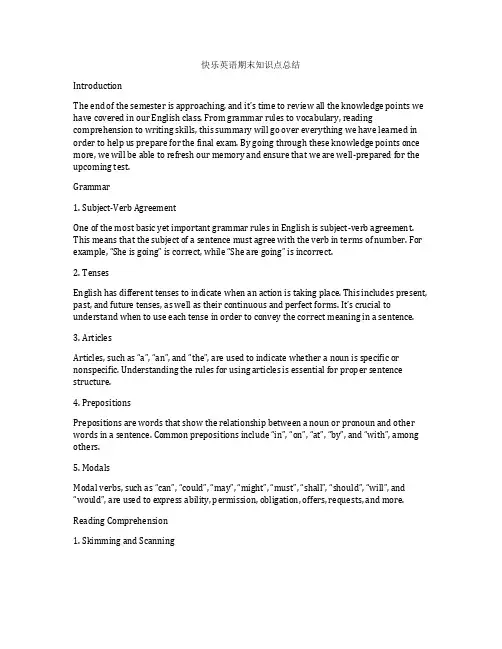
快乐英语期末知识点总结IntroductionThe end of the semester is approaching, and it’s time to review all the knowledge points we have covered in our English class. From grammar rules to vocabulary, reading comprehension to writing skills, this summary will go over everything we have learned in order to help us prepare for the final exam. By going through these knowledge points once more, we will be able to refresh our memory and ensure that we are well-prepared for the upcoming test.Grammar1. Subject-Verb AgreementOne of the most basic yet important grammar rules in English is subject-verb agreement. This means that the subject of a sentence must agree with the verb in terms of number. For example, “She is going” is correct, while “She are going” is incorrect.2. TensesEnglish has different tenses to indicate when an action is taking place. This includes present, past, and future tenses, as well as their continuous and perfect forms. It’s crucial to understand when to use each tense in order to convey the correct meaning in a sentence.3. ArticlesArticles, such as “a”, “an”, and “the”, are used to indicate whether a noun is specific or nonspecific. Understanding the rules for using articles is essential for proper sentence structure.4. PrepositionsPrepositions are words that show the relationship between a noun or pronoun and other words in a sentence. Common prepositions include “in”, “on”, “at”, “by”, and “with”, among others.5. ModalsModal verbs, such as “can”, “could”, “may”, “might”, “must”, “shall”, “should”, “will”, and “would”, are used to express ability, permission, obligation, offers, requests, and more. Reading Comprehension1. Skimming and ScanningSkimming and scanning are essential reading strategies that help us quickly identify key information in a passage. Skimming involves reading rapidly to get the main idea, while scanning involves looking for specific details.2. InferenceInference is the ability to make an educated guess based on the information provided in a passage. It requires understanding the context and drawing logical conclusions.3. Main Idea and Supporting DetailsUnderstanding the main idea of a passage and the supporting details that contribute to it is crucial for comprehension. This involves identifying the central point of a passage and the specific information that backs it up.4. Vocabulary in ContextBeing able to infer the meaning of unfamiliar words from the context in which they appear is a valuable skill in reading comprehension. This allows us to expand our vocabulary and understand the overall meaning of a passage.Writing Skills1. Structure and OrganizationA well-written piece of writing follows a clear structure and organization. This includes an introduction, body paragraphs, and a conclusion, as well as logical transitions between ideas.2. Coherence and CohesionCoherence refers to the overall unity and flow of a piece of writing, while cohesion refers to the way that individual elements are connected. Both are important for creating a well-structured and readable text.3. Sentence VarietyUsing a variety of sentence structures and lengths can make writing more engaging and dynamic. This includes simple, compound, and complex sentences, as well as different sentence beginnings.4. Grammar and MechanicsProper grammar and punctuation are essential for clear and effective communication in writing. This includes using correct verb tenses, subject-verb agreement, punctuation marks, and more.Vocabulary1. Word FormationUnderstanding how words are formed, including prefixes, suffixes, and root words, can help us expand our vocabulary and understand the meaning of unfamiliar words.2. Synonyms and AntonymsKnowing synonyms and antonyms for a wide range of words can help us express ourselves more precisely and understand the nuances of language.3. Context CluesUsing context clues to infer the meaning of unfamiliar words is a valuable skill that helps us expand our vocabulary and understand the overall meaning of a passage.ConclusionBy reviewing these key knowledge points for the English final exam, we can ensure that we are well-prepared for the upcoming test. This summary serves as a thorough reminder of all the important concepts we have covered throughout the semester, and it will help us feel more confident and ready to succeed. Good luck to everyone on the final exam!。
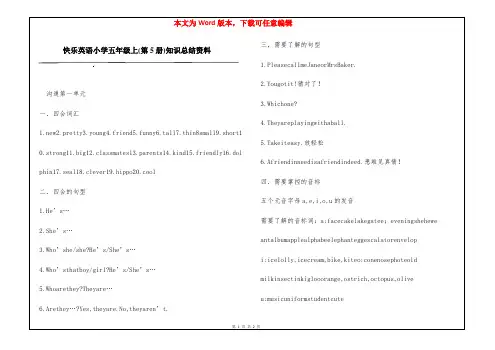
快乐英语小学五年级上(第5册)知识总结资料沟通第一单元一.四会词汇1.new2.pretty3.young4.friend5.funny6.tall7.thin8small9.short1 0.strong11.big12.classmates13.parents14.kind15.friendly16.dol phin17.seal18.clever19.hippo20.cool二.四会的句型1.He’s…2.She’s…3.Who’she/she?He’s/She’s…4.Who’sthatboy/girl?He’s/She’s…5.Whoarethey?Theyare…6.Arethey…?Yes,theyare.No,theyaren’t. 三,需要了解的句型1.PleasecallmeJaneorMrsBaker.2.Yougotit!猜对了!3.Whichone?4.Theyareplayingwithaball.5.Takeiteasy.放轻松6.Afriendinneedisafriendindeed.患难见真情!四.需要掌控的音标五个元音字母a,e,i,o,u的发音需要了解的音标词:a:facecakelakegatee;eveningshehewe antalbumapplealphabeelephanteggescalatorenvelopi:icelolly,icecream,bike,kiteo:conenosephoteold milkinsectinkiglooorange,ostrich,octopus,oliveu:musicuniformstudentcuteumbrellacupumpirebus五.其他知识1.一些词的反义词。
black__whiteyoung___oldfat__thincome___gotall___shortbig___sm allnew___oldno___yes2.人称代词(I,you,he,she,it,we,you,they)指示代词〔this,that,these,those〕疑问词〔what,who〕与be〔is,am,are〕的搭配。
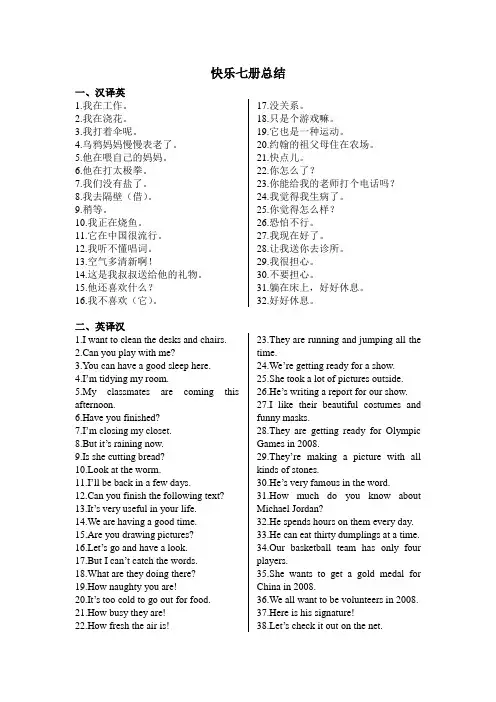
快乐七册总结一、汉译英1.我在工作。
2.我在浇花。
3.我打着伞呢。
4.乌鸦妈妈慢慢表老了。
5.他在喂自己的妈妈。
6.他在打太极拳。
7.我们没有盐了。
8.我去隔壁(借)。
9.稍等。
10.我正在烧鱼。
11.它在中国很流行。
12.我听不懂唱词。
13.空气多清新啊!14.这是我叔叔送给他的礼物。
15.他还喜欢什么?16.我不喜欢(它)。
17.没关系。
18.只是个游戏嘛。
19.它也是一种运动。
20.约翰的祖父母住在农场。
21.快点儿。
22.你怎么了?23.你能给我的老师打个电话吗?24.我觉得我生病了。
25.你觉得怎么样?26.恐怕不行。
27.我现在好了。
28.让我送你去诊所。
29.我很担心。
30.不要担心。
31.躺在床上,好好休息。
32.好好休息。
二、英译汉1.I want to clean the desks and chairs.2.Can you play with me?3.You can have a good sleep here.4.I’m tidying my room.5.My classmates are coming this afternoon.6.Have you finished?7.I’m closing my closet.8.But it’s raining now.9.Is she cutting bread?10.Look at the worm.11.I’ll be back in a few days.12.Can you finish the following text?13.It’s very useful in your life.14.We are having a good time.15.Are you drawing pictures?16.Let’s go and have a look.17.But I can’t catch the words.18.What are they doing there?19.How naughty you are!20.It’s too cold to go out for food.21.How busy they are!22.How fresh the air is! 23.They are running and jumping all the time.24.We’re getting ready for a show.25.She took a lot of pictures outside.26.He’s writing a report for our show.27.I like their beautiful costumes and funny masks.28.They are getting ready for Olympic Games in 2008.29.They’re making a picture with all kinds of stones.30.He’s very famous in the word.31.How much do you know about Michael Jordan?32.He spends hours on them every day.33.He can eat thirty dumplings at a time.34.Our basketball team has only four players.35.She wants to get a gold medal for China in 2008.36.We all want to be volunteers in 2008.37.Here is his signature!38.Let’s check it out on the net.39.What sports does he like?40.How do you know that?41.It’s a kind of Chinese dance.42.She goes to work on foot.43.He often helps them with farm work.44.Maybe you have a cold.45.How do you feel?46.I want to take my bad tooth out.47.Not much better. 48.You’d better go out to get some fresh air.49.What’s the matter with you?50.Stay in bed and have a good rest.51.So he can’t attend classes today.52.You see, a runny nose and tears.53.You took the wrong tooth.54.Maybe it will be fine tomorrow.55.Oh,forget that.三、口试问题总结Unit 11.A:What are you doing?,B:I’m cleaning the windows./mopping the floor./sweeping the floor./looking for my glasses./tidying my room./doing my homework./reading books./singing./dancing. (We are talking./singing./laughing.)A:What are they doing? B:They’re running.2.A:What is he/she doing?,B:He’s/She’s riding a bike./cutting bread./washing vegetables./eating.3.A:What’s the girl/the boy/the woman/the man doing?,B:He’s/She’s drinking./playing the violin./playing the piano./flying the kite.4.A:Is she/he playing the piano?,B:No, she/he isn’t.She/He is playing the violin./Yes ,she/he is.5.A:Can you do it? B:Yes,I can./No ,I can’t.Unit 21.A:Are you drawing pictures? B:No,I’m not.I’m doing my homework.2.A:Where’s your bag? B:It’s on the desk.3.A:Are you dancing?/Are they cooking?,B:No, we aren’t.We are singing.(Yes, we are.)/Yes,they are.(No,they aren’t.)4.A:Who’s taking pictures there? B:My mother./My sister./Linda.Unit 31.A:What sports does she/he like? B:She/He likes bowling./golf./volleyball.2.A:How do you know that? B:It’s on the net.3.A:Does she/he like singing? B:Yes,she/he does.(No, she/he doesn’t.)4.A:Where does he/she work? B:He/She works in a school./in a hospital.5.A:When does he/she go to work? B:She/He goes to work at 7:00 am.6.A:How does he/she go to work? B:She/He goes to work by bike./on foot.7.A:What’ her/his job? B:He/She is a doctor./nurse./driver./farmer. Unit 41.A:What’s wrong with you?,B:I fee dizzy./sick.(I have a headache.)2.A:How do you feel today? B:I feel sick./cold./dizzy.(I feel very well.)3.A:How are you feeling today? B:Not much better.(I’m feeling much better.)4.What’s the matter with you? B:I can’t find my book./dog./cat./mother./。
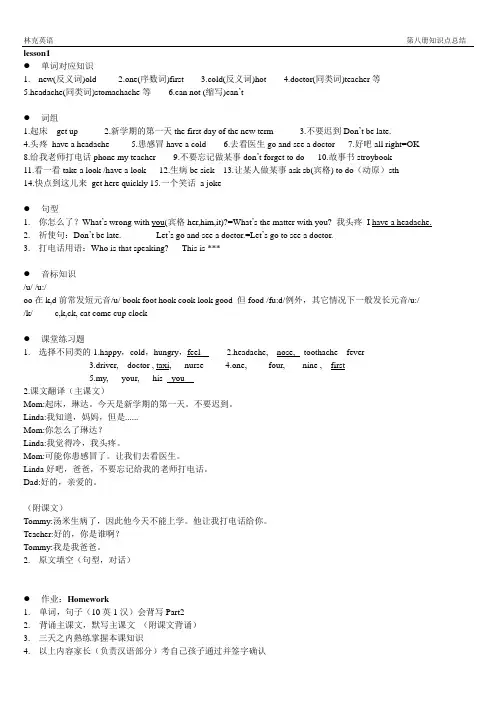
林克英语第八册知识点总结lesson1●单词对应知识1.new(反义词)old2.one(序数词)first3.cold(反义词)hot4.doctor(同类词)teacher等5.headache(同类词)stomachache等6.can not (缩写)can’t●词组1.起床get up2.新学期的第一天the first day of the new term3.不要迟到Don’t be late.4.头疼have a headache5.患感冒have a cold6.去看医生go and see a doctor7.好吧all right=OK8.给我老师打电话phone my teacher 9.不要忘记做某事don’t forget to do 10.故事书stroybook11.看一看take a look /have a look 12.生病be sick 13.让某人做某事ask sb(宾格) to do(动原)sth14.快点到这儿来get here quickly 15.一个笑话a joke●句型1.你怎么了?What’s wrong with you(宾格her,him,it)?=What’s the matter with you? 我头疼I have a headache.2.祈使句:Don’t be late. Let’s go and see a doctor.=Let’s go to see a doctor.3.打电话用语:Who is that speaking? This is ***●音标知识/u/ /u:/oo在k,d前常发短元音/u/ book foot hook cook look good 但food /fu:d/例外,其它情况下一般发长元音/u://k/ c,k,ck, cat come cup clock●课堂练习题1.选择不同类的1.happy,cold,hungry,feel2.headache, nose, toothache fever3.driver, doctor , taxi, nurse4.one, four, nine , first5.my, your, his you2.课文翻译(主课文)Mom:起床,琳达。
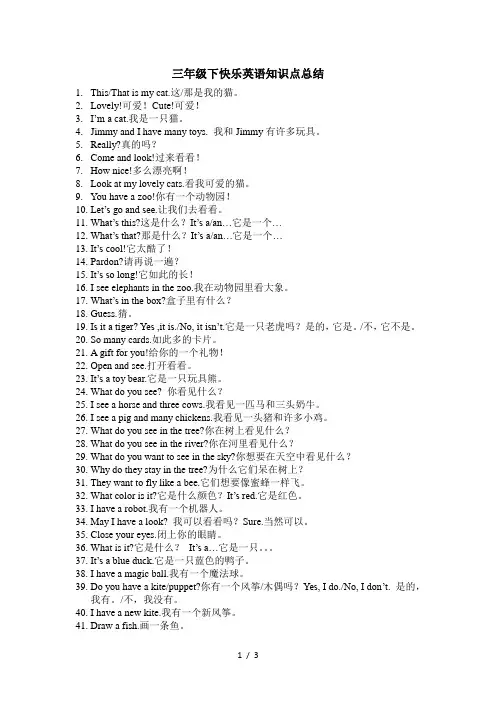
三年级下快乐英语知识点总结1.This/That is my cat.这/那是我的猫。
2.Lovely!可爱!Cute!可爱!3.I’m a cat.我是一只猫。
4.Jimmy and I have many toys. 我和Jimmy有许多玩具。
5.Really?真的吗?e and look!过来看看!7.How nice!多么漂亮啊!8.Look at my lovely cats.看我可爱的猫。
9.You have a zoo!你有一个动物园!10.Let’s go and see.让我们去看看。
11.What’s this?这是什么?It’s a/an…它是一个…12.What’s that?那是什么?It’s a/an…它是一个…13.It’s cool!它太酷了!14.Pardon?请再说一遍?15.It’s so long!它如此的长!16.I see elephants in the zoo.我在动物园里看大象。
17.What’s in the box?盒子里有什么?18.Guess.猜。
19.Is it a tiger? Yes ,it is./No, it isn’t.它是一只老虎吗?是的,它是。
/不,它不是。
20.So many cards.如此多的卡片。
21.A gift for you!给你的一个礼物!22.Open and see.打开看看。
23.It’s a toy bear.它是一只玩具熊。
24.What do you see? 你看见什么?25.I see a horse and three cows.我看见一匹马和三头奶牛。
26.I see a pig and many chickens.我看见一头猪和许多小鸡。
27.What do you see in the tree?你在树上看见什么?28.What do you see in the river?你在河里看见什么?29.What do you want to see in the sky?你想要在天空中看见什么?30.Why do they stay in the tree?为什么它们呆在树上?31.They want to fly like a bee.它们想要像蜜蜂一样飞。
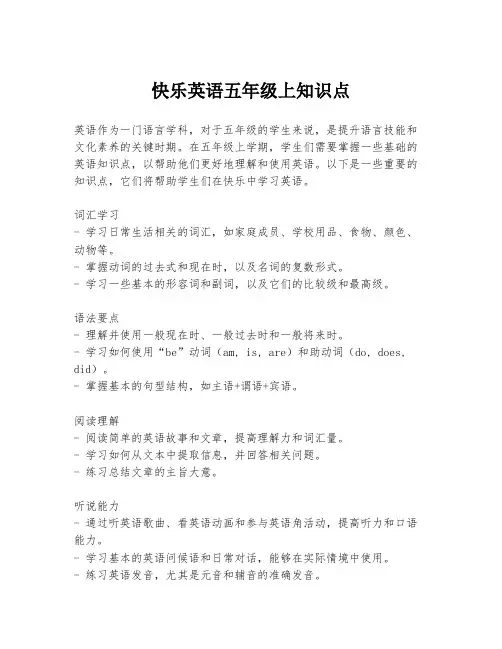
快乐英语五年级上知识点英语作为一门语言学科,对于五年级的学生来说,是提升语言技能和文化素养的关键时期。
在五年级上学期,学生们需要掌握一些基础的英语知识点,以帮助他们更好地理解和使用英语。
以下是一些重要的知识点,它们将帮助学生们在快乐中学习英语。
词汇学习- 学习日常生活相关的词汇,如家庭成员、学校用品、食物、颜色、动物等。
- 掌握动词的过去式和现在时,以及名词的复数形式。
- 学习一些基本的形容词和副词,以及它们的比较级和最高级。
语法要点- 理解并使用一般现在时、一般过去时和一般将来时。
- 学习如何使用“be”动词(am, is, are)和助动词(do, does, did)。
- 掌握基本的句型结构,如主语+谓语+宾语。
阅读理解- 阅读简单的英语故事和文章,提高理解力和词汇量。
- 学习如何从文本中提取信息,并回答相关问题。
- 练习总结文章的主旨大意。
听说能力- 通过听英语歌曲、看英语动画和参与英语角活动,提高听力和口语能力。
- 学习基本的英语问候语和日常对话,能够在实际情境中使用。
- 练习英语发音,尤其是元音和辅音的准确发音。
写作技巧- 学习如何写英语日记和简单的书信。
- 练习使用正确的单词拼写和语法结构。
- 学习如何组织句子和段落,使写作内容清晰、连贯。
文化理解- 了解一些英语国家的节日和习俗,如圣诞节、万圣节等。
- 学习不同文化背景下的表达方式和行为习惯。
- 通过英语了解世界,拓宽国际视野。
复习与测试- 定期复习所学知识,通过做练习题和模拟测试来巩固记忆。
- 学会使用英语字典和参考资料,提高自学能力。
通过这些知识点的学习,学生们不仅能够提高英语水平,还能够在快乐的氛围中享受学习的过程。
记住,学习英语是一个长期的过程,需要持之以恒的努力和练习。
希望每位学生都能在英语学习的道路上不断进步,享受学习带来的快乐。
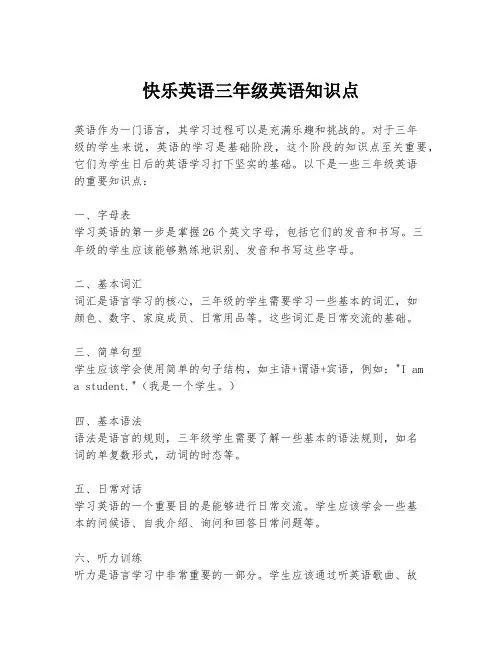
快乐英语三年级英语知识点英语作为一门语言,其学习过程可以是充满乐趣和挑战的。
对于三年级的学生来说,英语的学习是基础阶段,这个阶段的知识点至关重要,它们为学生日后的英语学习打下坚实的基础。
以下是一些三年级英语的重要知识点:一、字母表学习英语的第一步是掌握26个英文字母,包括它们的发音和书写。
三年级的学生应该能够熟练地识别、发音和书写这些字母。
二、基本词汇词汇是语言学习的核心,三年级的学生需要学习一些基本的词汇,如颜色、数字、家庭成员、日常用品等。
这些词汇是日常交流的基础。
三、简单句型学生应该学会使用简单的句子结构,如主语+谓语+宾语,例如:"I am a student."(我是一个学生。
)四、基本语法语法是语言的规则,三年级学生需要了解一些基本的语法规则,如名词的单复数形式,动词的时态等。
五、日常对话学习英语的一个重要目的是能够进行日常交流。
学生应该学会一些基本的问候语、自我介绍、询问和回答日常问题等。
六、听力训练听力是语言学习中非常重要的一部分。
学生应该通过听英语歌曲、故事和对话来提高自己的听力理解能力。
七、发音练习正确的发音对于语言学习至关重要。
学生应该通过模仿和练习来提高自己的发音能力。
八、书写练习书写是表达思想的一种方式。
学生应该练习书写字母、单词和句子,注意字母的大小写和单词的拼写。
九、阅读练习阅读能够帮助学生扩大词汇量和提高理解能力。
学生应该阅读适合自己水平的英语读物,如简单的英文绘本和故事书。
十、游戏和活动通过游戏和活动学习英语可以增加学习的趣味性。
教师可以设计一些英语游戏,如单词接龙、角色扮演等,让学生在轻松愉快的氛围中学习英语。
通过这些知识点的学习,三年级的学生可以建立起对英语的基本认识和兴趣,为今后的英语学习打下良好的基础。
记住,学习英语是一个长期的过程,需要耐心和持续的努力。
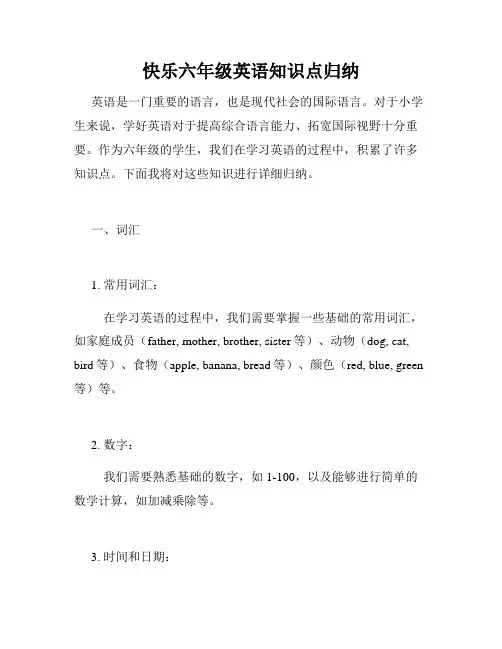
快乐六年级英语知识点归纳英语是一门重要的语言,也是现代社会的国际语言。
对于小学生来说,学好英语对于提高综合语言能力、拓宽国际视野十分重要。
作为六年级的学生,我们在学习英语的过程中,积累了许多知识点。
下面我将对这些知识进行详细归纳。
一、词汇1. 常用词汇:在学习英语的过程中,我们需要掌握一些基础的常用词汇,如家庭成员(father, mother, brother, sister等)、动物(dog, cat, bird等)、食物(apple, banana, bread等)、颜色(red, blue, green 等)等。
2. 数字:我们需要熟悉基础的数字,如1-100,以及能够进行简单的数学计算,如加减乘除等。
3. 时间和日期:熟悉时间和日期的表达方式,包括星期几、月份、季节以及常见节日等。
4. 学科和课程:掌握一些学科和课程的基本词汇,如数学(mathematics)、科学(science)、音乐(music)等。
5. 常见动词:熟悉一些常见动词的用法,如play, study, read等。
6. 常用短语:学习一些常用的英语短语,如hello, thank you, how are you等。
二、语法1. 现在进行时:学习并掌握现在进行时的基本用法,表示正在进行的动作。
2. 一般现在时:学会正确使用一般现在时,表示经常性或习惯性的动作、客观真理或普遍规律等。
3. 一般过去时:理解并熟练运用一般过去时,用于过去发生的动作或状态。
4. 一般将来时:学习一般将来时的基本用法,表示将要发生的动作或打算、计划等。
5. 形容词的比较级和最高级:掌握形容词比较级和最高级的用法,以及规则和不规则变化形式。
6. 名词的复数形式:熟悉名词的复数形式的变化规则,掌握不规则变化的常见名词。
三、阅读理解1. 短文阅读:学习阅读短文的技巧,理解文章的主题、大意和细节信息。
2. 根据短文回答问题:在阅读短文后,能够准确回答与文中内容相关的问题。
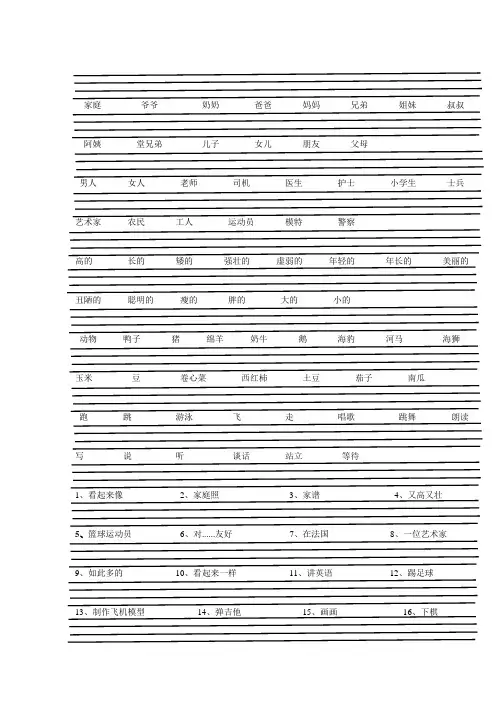
家庭爷爷奶奶爸爸妈妈兄弟姐妹叔叔阿姨堂兄弟儿子女儿朋友父母男人女人老师司机医生护士小学生士兵艺术家农民工人运动员模特警察高的长的矮的强壮的虚弱的年轻的年长的美丽的丑陋的聪明的瘦的胖的大的小的动物鸭子猪绵羊奶牛鹅海豹河马海狮玉米豆卷心菜西红柿土豆茄子南瓜跑跳游泳飞走唱歌跳舞朗读写说听谈话站立等待1、看起来像2、家庭照3、家谱4、又高又壮5、篮球运动员6、对......友好7、在法国8、一位艺术家9、如此多的10、看起来一样11、讲英语12、踢足球13、制作飞机模型14、弹吉他15、画画16、下棋1、这是我的妈妈。
2、欢迎到我家来。
3.这是你的哥哥吗?是的,他是。
不,他不是。
4、看我的家庭照。
5、他是谁?他是我们的体育老师。
6、他又高又壮。
7、我有一位新朋友。
8、她高吗?是的,她是。
不,她不是。
9、我的爸爸很棒。
10、他的工作是什么?他是一名出租车司机。
11、他们是做什么的?他们是警察。
12、我想要当一名艺术家。
13、它们是什么?他们是鹅。
14、欢迎到我们农场来。
15、它们是土豆吗?是的,它们是。
不,它们不是。
16、如此多的鸭子。
17、你会做什么?我会蹦。
18、他会做什么?他会做飞机模型。
19、你会唱歌和跳舞吗?是的,我会。
不,我不会。
20、像鸭子一样走。
21、我不会爬树。
22、好习惯23、站排24、不要推25、听讲26、右侧通行27、等绿灯28、用右腿站立。
29、闭上眼睛。
30、不要看太长时间。
第一单元总结复习知识点语法:现在分词进行时:主要表示现在或现在这一阶段正在进行的动作。
由现在进行时由主语+助动词be+动词的现在分词:1.在动词末尾直接加ingRead tidy open sing clean sweep 2.动词末尾去e加ingClose write come dance have3.双写动词末尾字母加ingCut mop sit run put重点单词:Clean mop sweep tidy close open cook cut Wash dance drink eat do draw kick try词组:Look for my glasses找我的眼睛Clean the window 擦玻璃Open the door 开门Close the window 关窗Tidy the closer 整理衣橱Cut bread 切面包Cook noodles 煮面条Wash clothes洗衣服Have a try试一试Kick the shuttlecock 踢毽子Play the violin 拉小提琴句型:1.What are you doing?---I am reading book.2.what’s he/she doning?---he/she is palying.3.Is she cleaning the classroom?---Yes she is.4.Are you reading book?---Yes,I am./we are.实用句型:Sorry,I’m busy。
Have you finished?---Not yet。
I want to clean the desk and chair.。
Lesson 1单词1.today 今天2.new 新的3.student 学生4.Takuya 拓也;铃木仁*5.Japan 日本6. welcome欢迎7.Tom 汤姆8.Joker乔克8. joker爱开玩笑的人9. Australia 澳大利亚10.which哪个;哪一个11.Johnson 约翰逊12.John约翰13son 儿子14Mrs夫人;太太15Bright布朗16bright明亮的句子1.Today we have two new students. 今天我们来了两名新同学。
2. A: Where are you from? 你来自哪里?B: I’m from England. 我来自英格兰。
3. Are you Helen? 你是海伦吗?Yes, I am. 是的,我是。
No, I’m not. / No, I am not. 不,我不是。
4. Which class are you in? 你在哪班?We’re in Class 1. 我在一班。
5. What class are you in? 你在几班?We are in Class1 Grade2. 我在二年一班。
6. This is Mrs Bright. 这是布莱克夫人。
Is this Mrs Bright? 这是布莱克夫人吗?Yes, (it is). 是的,这是。
No, (it isn’t.)不,这不是。
7. Good to know you. 认识你真好。
Nice to see you. 见到你很高兴。
Glad to meet you. 遇见你很高兴Lesson 2单词*1.England 英格兰* 2.China 中国* 3.America 美国 4.ask 问;询问 5.friend 朋友6.age 年龄7.telephone 电话8.telephone number 电话号码9.city 城市复数cities 10.together 一起句子1. Ask your friends. 问你的朋友。
百思特英语学校Doris同步英语快乐英语第五册Lesson16-18小结需重点掌握的单词:season季节spring春天summer夏天autumn秋天winter冬天plant种植tree树flower花go fishing去钓鱼go skating去滑冰需熟练掌握的单词:So如此beautiful美丽stay停留back后面,背部black黑色的clock钟kick踢cheese乳酪China中国cherry樱桃wait等待minute分钟umbrella雨伞our我们的garden花园exciting令人激动的thirty三十thirteen十三hometown家乡different不同的everything每件事bright明亮的sandals拖鞋sunglasses太阳镜golden金色的fall秋天bounce弹跳fast快的slow展示ride骑high高的low低的live居住miss错过early早的wet湿的note便条sad悲伤的cardboard硬纸板sheets被单coolest最酷的需要掌握的词组:favorite season最喜爱的季节make snowmen堆雪人It doesn’t matter.没关系in the water 在水中wait a minute稍等in spring在春天plant trees and flowers种植树和花in summer在夏天go swimming去游泳in the daytime在白天live in住在turn on 打开(开关)get up起床start to rain 开始下雨on the door 在门上需要掌握的重点句型:1.What’s your favorite season?2.Winter is so cool.3.I like snow.4.I like to make snowmen.5.I like swimming.6.Look out!7.Let’s go hiking.8.Don’t worry.9.What do you do in spring?10.But my favorite season is summer.11.What do you do in summer?12.I go swimming and go fishing with my parents.13.My favorite season is winter.14.I can make snowmen and go skating!15.I like to go hiking.16.I like to wear a jacket and sneakers.17.I like to climb hills.18.I like to wear jeans and sneakers.19.I like to make a snowman.20.It will be fine tomorrow.21.It’s really a fine day.总结:I like (后加名词) spring/summer/autumn/winter/dogs/apples/snow…(后加动名词) swimming/singing/playing football…(后加to + 动词)to go hiking/to wear a jacket/to go to the beach/to climb trees/to make a snowman…。
快乐英语知识点总结Learning English can be a joyful and enriching experience. From grammar to vocabulary, speaking to writing, there are many aspects of the language that can bring joy and satisfaction to learners. In this summary, we will explore some of the key points of English language learning that can bring happiness and fulfillment.One of the most important aspects of learning English is building a strong vocabulary. Having a wide range of words at your disposal can greatly enhance your ability to communicate effectively and understand the language. There are many fun and effective ways to expand your vocabulary, such as reading books, watching movies and TV shows, and using flashcards. Learning new words and phrases can be a delightful experience, especially when you start to see them used in real-life situations.In addition to vocabulary, grammar is another essential aspect of learning English. While some may find grammar to be a daunting subject, it can also be a source of joy and satisfaction. Understanding the rules and structure of the language can give you a sense of accomplishment and empower you to express yourself more clearly. By mastering the various tenses, sentence structures, and parts of speech, you can feel more confident in your ability to communicate effectively.Furthermore, speaking and listening are vital skills for anyone learning English. The ability to converse fluently and understand spoken language is essential for real-life communication. Engaging in conversations with native speakers, practicing pronunciation, and listening to English speakers can all be enjoyable experiences that improve your language skills. As you become more proficient in speaking and listening, you'll gain a sense of achievement and enjoyment in your progress.Writing is another key skill in learning English. Whether you're composing essays, emails, or creative pieces, the ability to express yourself through writing is a rewarding pursuit. Writing allows you to articulate your thoughts and ideas, and it can be a fulfilling experience to see your words come to life on the page. By honing your writing skills, you can develop a deeper appreciation for the language and find joy in the process of self-expression.In addition to the core language skills, there are many other aspects of English that can bring happiness to learners. For example, learning about English-speaking cultures, traditions, and literature can be an enlightening and enjoyable experience. Exploring the works of famous authors, understanding different cultural practices, and immersing yourself in English-speaking communities can broaden your horizons and bring a sense of fulfillment to your language learning journey.Moreover, the availability of resources and technology has made learning English more accessible and enjoyable than ever before. Online courses, language apps, and interactive learning tools provide new and innovative ways to engage with the language. Theseresources can make the learning process more engaging and interactive, allowing you to progress in your studies while having fun along the way.Finally, the sense of accomplishment and self-improvement that comes with learning English can be a source of great joy. As you make progress in your language skills, you'll feel a sense of pride and satisfaction in your achievements. Whether it's reaching a new level of fluency, successfully completing a language course, or mastering a challenging aspect of the language, these milestones can bring a deep sense of happiness and fulfillment.In conclusion, there are many aspects of learning English that can bring joy and satisfaction to learners. From building vocabulary to mastering grammar, improving speaking and listening skills, and exploring the richness of English-speaking cultures, the language offers a wealth of opportunities for happiness and fulfillment. By embracing the many facets of English language learning, you can enjoy a rewarding and enriching journey towards language proficiency.。
小学快乐英语知识点总结一、英语字母英语字母一共26个,分别是:A、B、C、D、E、F、G、H、I、J、K、L、M、N、O、P、Q、R、S、T、U、V、W、X、Y、Z。
英语字母可以分为大写字母和小写字母,大写字母的形式比小写字母要复杂,英文书写时大写字母在句首,而小写字母在词中。
每个字母都有自己的音标,孩子们要学会正确地发音。
二、数字英语数字从1到10分别是:one、two、three、four、five、six、seven、eight、nine、ten。
数字从11到20则是在原来的基础上在前面加上teen,比如11是eleven,12是twelve,13是thirteen,一直到19。
数字20是twenty,21是twenty-one,22是twenty-two,一直到29,以此类推。
100是one hundred,1000是one thousand。
三、颜色英语的颜色有红色(red)、橙色(orange)、黄色(yellow)、绿色(green)、蓝色(blue)、紫色(purple)、黑色(black)、白色(white)、棕色(brown)、粉色(pink)等。
孩子们在学习颜色的时候可以用彩色笔或者颜色卡片进行辨认。
四、动物英语中常见的动物有狗(dog)、猫(cat)、鸟(bird)、鸭子(duck)、鱼(fish)、兔子(rabbit)、熊(bear)、猪(pig)、牛(cow)、鸡(chicken)等。
孩子们可以通过图片和声音来学习认知这些动物,增加记忆。
五、家庭关于家庭成员的英文词汇有爸爸(father)、妈妈(mother)、爷爷(grandfather)、奶奶(grandmother)、儿子(son)、女儿(daughter)、姐姐(sister)、哥哥(brother)、外公(grandfather)、外婆(grandmother)等。
这些单词在日常生活中常用,孩子们可以多练习用这些单词来描述自己的家庭成员,增加口语表达能力。
快乐英语9知识点总结1Unit1 Lesson 1 1. look ....tired 看起来疲劳*look 为联系动词,看起来 2. just .... sleep 只是..困 3. at about ..... 7:30 大约..在7:30*表示时间介词用at 4. You should ...... get up earlier.你应该..早点起床。
*should 情态动词+get up 动词原形(短语) (以下用V.原表示) 5. usually 通常、often 经常*频率副词+V.原(一般现在时标志)6. then 然后7. with 和……一起8. every 每个(一般现在时标志)feel sleepy 感觉困* feel 为联系动词,感觉到 9. earlier*形容词early (简单、容易)的比较级 10. have a good time过得很愉快have a hard time 过得很艰难good 反义词 hard 11. be busy doing sth.忙于做某事*V+ing 为现在分词,用于现在进行时或做非谓语动词 12. squirrel 松鼠 pine nuts 松果 cricket 蟋蟀 13. 到达14. No,I don ’t need it! 不,我不需要。
15. stay in ..their warm house 待在他们温暖的房子里 stay at ..home 待在家里 16. 不许做 .ing e.g.No swimming.不许游泳。
don ’t + V . Don ’t swim.不许游泳。
17. too late 太晚了18. go jogging 去慢跑19. with my parents 和我的父母一起20. go to bed 睡觉21. o’clock ……点钟22. not any=no 表示一点都没有参考译文:主课文你看起来很疲劳,比利。
快乐英语第七册第一单元知识点总结Lesson 1I词组总结I. primary school 小学 2. go together 一起去3. ................................................................... go along 沿着…..走4. in front of 在................. 的前面5. middle school 中学6. next to 紧挨着7. a tall tree 一棵大树8. under the tree 在树下9. near the house 在房子附近10. in the tree 在树上II. come down 下来12 excuse me 打扰一下H知识点总结1. There be句型(I)“某地有某物”⑴There is +不可数名词+其它eg:There is some milk on the floor.物地点⑵There is+可数名词单数+其它eg: There is an apple on the tree.物地点2. 问路⑴ Excuse me! Where 's Guangming Primary School?⑵ Excuse me! Is there a bank near here?(3) Excuse me! How can I get the bank? 答语:⑴ Go along this street.⑵ Turn right at the traffic lights(3) You can find it on your right.3. 感谢用语⑴ Thank you.= Thanks.⑵ Thank you very much. =Thanks a lot.回答:⑴ Not at all.⑵ My pleasure.(3) You're welcome.■in the tree (落在树上) There is a monkey in4. 在树上- the tree.-on the tree (长在树上) There are five pearson the tree.Lesson 2I词组总结1. in our school 在我们学2. teaching building 教学楼3. good news 好消息4.a beautiful school 一所美丽的学校 5.welcome to…欢迎来到 .......H知识点总结1. There be句型(H)“某地有某物”⑴There are +可数名词复数+其它eg: There are thirty-six classes in our school.物地点⑵There be就近原则当be后接多个名词时,be要和离他最近的名词在数上保持一致。
①There is a football and two basketballs under my bed.物地点②There are two girls and a boy in my group.物地点Good morning! (正式)2. 早上好!Morning! (口语)3. Welcome to our school.欢迎来到我们学校。
(welcometo +地点。
)also用于肯定句,位于句中,be后实前;4. “也” vtoo用于肯定句、疑问句,位于句尾,前面用逗号隔开。
eg: We also have two gardens. = We have twogardens ,too.我们也有两个花园。
5. 电话用语:⑴找人①May I speak to David?我可以和大卫讲话吗?②Is David in? 大卫在家吗?③Is that David speaking?你是大卫吗?⑵应答:①Speaking. 请讲!②This is David speaking.我就是大卫。
Lesson 3I词组总结1. swimming pool 游泳池2. the first floor 一楼(美);二楼(英)3. on the second floor 在二楼(美)在三楼(英)4. in England 在英国5. near the sea 在海滨6. in the sky 在天空中7. on the river 在小河上8. a basketball court 篮球场9. go and have a look 去看一看H知识点总结「There be句型变一般疑问句(I)be提前变大写,句尾加问号,回答用yes, no.eg: There is a swimming pool in our school.'Is there a swimming pool in your school?肯定回答:Yes, there is .是的。
否定回答:No, there isn't.不,没有。
3.one的用法⑴代替上文岀现过的名词,避免重复;eg: I lost my pen ,I want to buy one.⑵the one表特定的人或物;eg: A: Which one do you want?B: The one on the left.Lesson 4I词组总结1. computer rooms 计算机教室2. the teachers' office 教师办公室3. in the classroom 在教室里4. computer class 计算机课5. have lunch 吃午饭6. of course 当然7.no problem 没问题8. check mye-mail查看我的电子邮件9. stand on the chair 站在椅子上H知识点总结I. There be句型变一般疑问句(H)be提前变大写,句尾加问号,回答用yes, no.There are some computers in our school.Are there any computers in your school ?肯定回答:Yes, there are .是的。
否定回答:No, therearen't.不,没有。
2. 名词所有格(有生命的名词)“……的”⑴有生命的单数名词,直接在此为加“、s” ; eg: theboy's bag 男孩的书包⑵以-s结尾的名词复数,在词尾加“'”;eg: teachers'office教师办公室⑶不规则的名词复数,在词尾加“'s” ; eg:Children's Day 儿童节Lesson 5I词组总结1. art rooms 美术教室2.music rooms 音乐教室3.one of .............. 中的一个4. how many 多少5.a train driver 火车驾驶员6. drive a train 开火车7. a big playground 一个大操场8.have a good time 玩的开心9.at the foot of the hill 在山脚下e with a gun带着一支枪来H知识点总结1. 对There be句型中的数量进行划线提问,用“ howmany”:eg^ There are fifteen boys in our class.F How many boys are there in your school? 回答:Thereare six.2. 感叹句:用来表示喜怒哀乐等强烈情感的句子。
句尾常用感叹号,一般读降调。
结构(1)How+形容词+主语+be!egHow lovely she is !结构(2)How+形容词+a/an+名词+ (主语+be)! eg:How big a cake (it is )!结构(3)What+a/an+形容词+名词+ (主语+be)! eg:What a big cake (it is )!注:结构(2)和结构(3)可以进行互换3. One of +可数名词复数+动词单三+其它。
2.英美在楼层表达上的差异:美国英国ground floor 一楼first floor 二楼一楼second floor 三楼二楼“……中的一个……”Lesson 6I词句总结⑵句子结构:主语+be+动词现在分词big warm抓住一条大虫子1. turn right 向右转2.good news 好消息3.You're welcome.不用谢. ⑶动词现在分词的变化规则:H知识点总结4.No problem. 没问题.5.This way please. 这边请. ①一般情况下,直接加-ing :do --- 1.get V.⑴得至U:I often get gifts from my parents.6.Thanks a lot.非常感谢doing ⑵到达:My father gets home at 6:00 every②以不发音e结尾,去e加-ing :ride---riding day.③以重读闭音节结尾,且末尾只有一个辅音字母,双⑶变得:①指人暂时性的身心变化或永久快乐英语第七册第二单元知识点总结写尾字行的自然变化;母,再加eg: get angry 生气get fat Lesson 7 -ing :变胖get old变老sit---sitti ②用于指天气的变化;eg: It'sI词组总结ng getting hot.天渐渐热了。
1.go and play football 去踢足球2.clean the window 擦⑷划线提问: 1 am cleaning the window. ⑷固定词组:get up起床窗户 3.play with …和 ... 玩 4. mop the floor 拖地What are you doing? 回答:I am … 2. back adv.回至U ..... be back = come5.sweep the floor 扫地6.look for 寻找back回来7.clean the desks and chairs 擦桌椅8.have a good 分析:①划线部分表达的是“做一件事”,对“事、I am back.我回sleep睡个好觉物”提问用特殊疑问词what;来了。
② 划线部分“cleaning the window”中‘cleaningdo的现在Lesson 9H知识点总结是动词clean的现在分词,要用分词doing来替换;1.现在进行时:③ 变问句时,1 am 要变Are you I词组总结⑴ 含义:表此时此刻或现阶段正在进行的动作或存 1.do kung fu 练功夫2.kick shuttlecock 踢毽子3.have a在的状态Lesson 8 try 试一试4. have no没有5.Mother Snail 蜗牛妈妈 6. eg:① I am mopping the floor. 我正在拖next door 隔壁7.in a few days 几天后地。